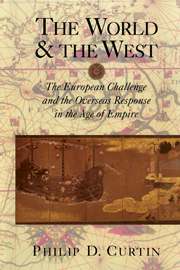1 - The Pattern of Empire
Published online by Cambridge University Press: 05 June 2012
Summary
The conventional history of European empire building not only lumps dissimilar experiences under the rubric of colonialism, but it often, and too readily, accepts convenient fictions, concocted by long-dead publicists, historians, and government officials, in place of reality. Historians in recent decades have made great progress in correcting this European bias, but much remains to be done.
One tendency of past historiography, not yet altogether corrected, is the tendency to read backward from the clear pattern of European dominance in the recent past, assuming that it was the case in earlier periods as well. Territorial empire and large-scale true colonization have origins that can be traced to these earlier times, but they flourished only in the period since about 1800, or even later.
In earlier centuries, the most important modes of culture contact were commercial, mediated by trade diasporas or the settlement of merchants along a trade route to facilitate commerce. These commercial settlers came only in small numbers but were often extremely important in the process of culture change. They were, in a sense, professional cross-cultural brokers, facilitating trade between the home region and its commercial outposts. Examples can be found in the earliest urban societies of Mesopotamia and in the pre-Columbian Americas.
- Type
- Chapter
- Information
- The World and the WestThe European Challenge and the Overseas Response in the Age of Empire, pp. 3 - 18Publisher: Cambridge University PressPrint publication year: 2000



